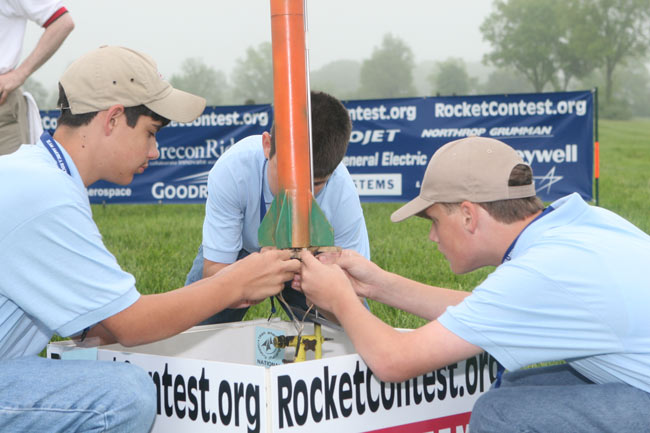Teen Rocket Scientists Go For Launch in Huge Contest

They may not have a 100-ton spaceship like NASA's shuttleAtlantis, but middle and high school students in Virginia will launch their ownself-made rockets Saturday in a nation-wide competition ? the largest suchcontest in the world.
The final round of the Team America Rocketry Challenge(TARC) will be held May 15 at Great Meadow in The Plains, Va., one day afterNASA launchedthe shuttle Atlantis on its last planned mission to the International SpaceStation. [Photosof Atlantis' launch.]
The top 100 teams that will compete in this final roundinclude squads from 30 states and the U.S. Virgin Islands, all qualifying froma pool of 669 teams and thousandsof students. ??
The contest, which is in its eighth year, is sponsored bythe Aerospace Industries Association (AIA) and the National Association ofRocketry. TARC has been held annually since 2002.
"This year's TARC contest will be among the mostcompetitive in its eight-year history because of the high number of teams thatare participating," said Marion C. Blakey, AIA President and CEO.
Teams are required to design, build and launch a modelrocket to an altitude of 825 feet (251 meters) with a raw egg payload. Therockets must also achieve a total flight duration lasting between 40 and 45seconds. To complete the challenge, the rockets must return the eggs safely andunbroken without the use of a parachute.
The contest was designed to spark student interest andenthusiasm in the fields of science, technology, engineering and mathematics,in hopes of attracting young people into careers in the aerospace industry.
Breaking space news, the latest updates on rocket launches, skywatching events and more!
"It's an exciting time for young people to be exposedto rocketry and all the aerospaceindustry has to offer," Blakey said. "We're seeing a real surgein our industry with TARC alumni taking advantage of exciting careeropportunities with many of our member companies."
One such alumnus is Johnna Esposito, who competed in TARC in2007. Esposito's contest experience built upon her love of rocketry andinspired her to pursue further studies in engineering. She is currentlymajoring in aerospace and ocean engineering at Virginia Tech in Blacksburg, Va.
"I planto pursue a career in rocketry, specifically in the field of propulsion engineering,"Esposito told SPACE.com. "Unfortunately several space programs have beencut under currentpolicies, but the way I see it, I started in model rocketry, and that willalways be there."
With thepresent labor force in the fields of science, technology, engineering andmathematics starting to age, cultivating student interest in these disciplines iscrucial to stay abreast of the latest industry developments and discoveries, saidAudrey Koehler, Team America Rocketry Challenge Manager for the AIA.
"AIArepresents all the major aerospace companies, and the average age of ourworkforce is over 50 and will soon be eligible to retire," Koehler toldSPACE.com. "We're interested in getting students to study math and scienceand to consider aerospace. TARC is a way for us to do that."
In the May15 event, prizes will also await teams with the best performances, including$60,000 in cash and scholarships that will be split between the top 10finishers. NASA also invites top teams to participate in their Student LaunchInitiative, which is an advanced rocketry program.
AIA membercompanies, such as Lockheed Martin and Raytheon have also sponsored prizes,which include scholarship money and a trip to an international air show.
- Gallery- Space Shuttle Atlantis' Last Blast Off
- TheBest Manned Spaceships of All Time
- NASALaunch Software Goes From the Simulator To the Classroom

Denise Chow is a former Space.com staff writer who then worked as assistant managing editor at Live Science before moving to NBC News as a science reporter, where she focuses on general science and climate change. She spent two years with Space.com, writing about rocket launches and covering NASA's final three space shuttle missions, before joining the Live Science team in 2013. A Canadian transplant, Denise has a bachelor's degree from the University of Toronto, and a master's degree in journalism from New York University. At NBC News, Denise covers general science and climate change.
